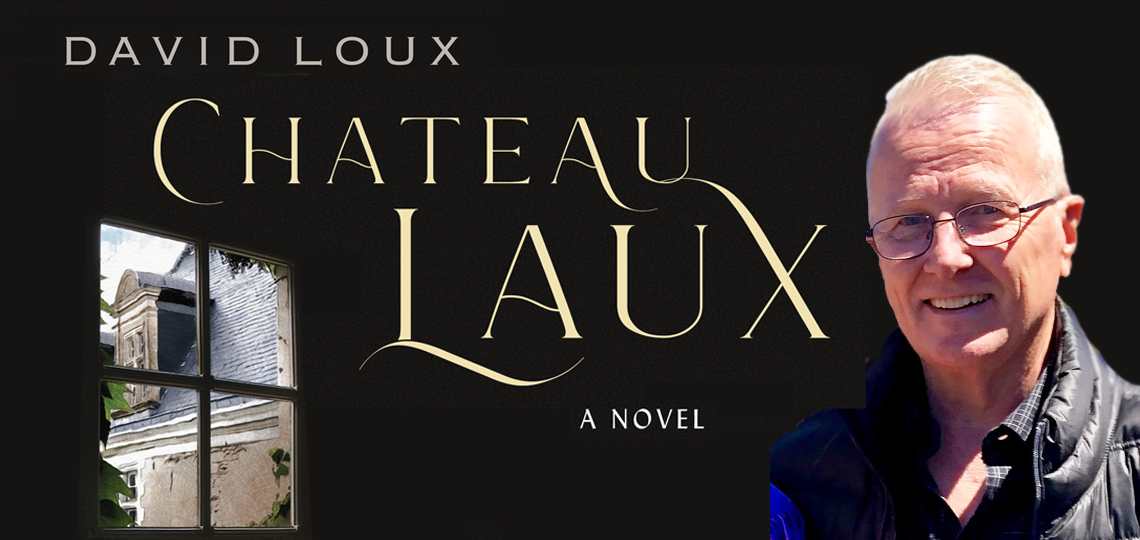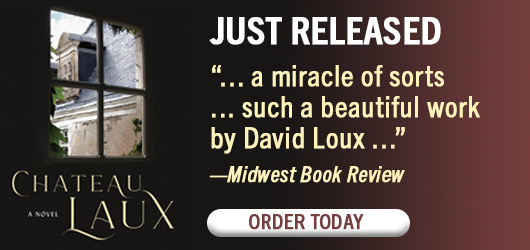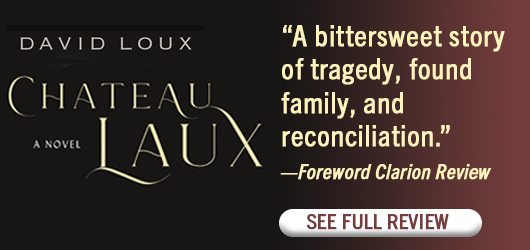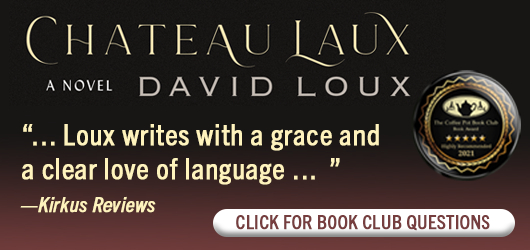Reviewer Aimee Jodoin Interviews David Loux, Author of Chateau Laux

If you found out that you descended from a noble French family with many hundreds of years of historical records to prove it, your imagination would surely take off in a multitude of directions. As it turns out, that scenario is exactly what happened to David Loux—he just happened to have the writing chops to pen Chateau Laux, a fantastic new work of historical fiction. After reading Aimee Jodoin’s Clarion review of the novel, we knew all the parts were in place for the following compelling interview between reviewer and author. Enjoy!
As you say in your historical note, Chateau Laux is rooted in real historical events. Can you discuss what drew you to this story and why you felt the desire to share it?
When I originally started researching Chateau Laux, I had no intention of writing a novel. Rather, the research was intended for a Laux family 300-year reunion, for which I was asked to present a paper on the surname’s provenance and meaning. As it turned out, the name was of noble origin, with records that went back to the Middle Ages. Upon meeting my French “cousins,” I found that some still bore titles as part of their names, and one was the widow of Peter Ustinov, an actor whom I had admired as a child. My own particular ancestor came to the American colonies alone, at the age of twenty-two, and I couldn’t help but wonder what had driven him to the wilds of the so-called New World.
Any number of the family’s many conflicts over time would have been engaging, but it was a particular event in their first-generation colonial experience that gripped me most intensely, because it was closest to my own time and the ghosts still lingered, so to speak. It didn’t factor into my presentation at the Laux reunion, of course, because it was not relevant to the provenance of the name. But it stuck with me for several years, and I finally had to write about it in an attempt to give Catharine Laux Kraymer and her innocent child new breaths of life, but also to try to understand how a family could have come to grips with such a tragic event and live with a past that surely must have tormented them.
The novel is classified as historical fiction, because it was based on a real incident within a historical context. But all of my editorial assessment readers agreed that it fell into the literary genre as well, because it attempts to take a clear-eyed look at the uncertainty of life in a wild landscape and the moral dilemmas faced not only by the antagonist, but by Catharine and her family.
There is immense historical detail in this book that makes colonial Pennsylvania feel real and tangible, and your acknowledgements give us a small glimpse into your deep dive into this history. Tell us about your research process. What resources did you use, and how did you decide which details to include or exclude?
Had I intended to write a novel all along, I might have approached the process differently. As it was, I literally buried myself in the research, seeking any and all avenues that might give me a glimpse of who the Laux family were. As I alluded to earlier, the family went back to the Middle Ages, and there are over fifteen phonetic variations of the name. I was exposed to information that had symbolic as well as literal meaning. Some of the information was in Latin, some in old French and even some in Spanish. Names change, as do their meanings and pronunciations and it is easy for researchers to miss crucial details that lay before their eyes in an unassuming or incomprehensible fashion. For instance, take the word “shepherd.” There are early references to some Lauxes being shepherds, and for many years family genealogists thought this meant that such individuals tended sheep. But other references indicate that Protestant ministers in the Languedoc were sometimes called shepherds, which yields the possibility of an entirely different interpretation.
With this in mind, I benefited greatly from research assistants at the Bibliothèque Nationale in Paris. I read French and did so extensively. The earliest known Laux ancestor was a Basque who most certainly came from Navarre, and with this in mind, I went to the Center for Basque Studies at the University of Nevada, where I met a French Basque who connected me with Occitan linguists in southern France. Finally, I traveled to France, where I met distant family members, who graciously shared information privy only to them.
When it came to deciding which details to include in the novel, I Intervened as a narrator when necessary but otherwise tried to stick to the nuanced views of my individual characters. Several reviewers have commented on the multiple POVs in the book, for the most part favorably. It was a device I used to angle around a topic and thereby limit narratorial intrusion as much as possible. If the limited knowledge of an individual character was not sufficiently illuminatory, and the overarching view of the narrator would be too intrusive, then I left the material out of the story.
Lawrence’s chateau is a symbol of honor, family, remembrance, and pride, a connection between the old world and the new. It is the center of the novel, yet it is fictional. What inspired your creative license concerning the chateau Lawrence builds in the story?
The creation of a colonial château was not entirely whimsical. There actually is a Laux château in York, Pennsylvania, though it wasn’t built until 1918 and is not the château depicted in the novel. That said, I needed a strong symbol to tie together the dramatic arcs of the characters in the book. I had just come back from France, where I visited three family châteaux, and it was the Laux château in York that gave me the idea of transplanting a European relic to the Pennsylvania frontier in colonial times, where it could serve as a symbol of both loss and renewal.
While the library where I work was closed for a few months last year, Ancestry.com offered a free trial, and I became obsessed with researching my heritage. I read your book in the middle of my exploration of my own deep roots in North America’s early history. As the Laux family in your novel are your ancestors, what part of their story made you feel most connected to them?
The story that affected me most deeply was the incident that inspired Chateau Laux in the first place. Prior to discovering this tragedy, I was already enamored with the family, from the Basque who crossed the Pyrenees in the eleventh century, down through the tumultuous upheavals of the Crusades and then on through the years of religious conflict, which first focused on competing Christian groups such as the Cathars and then, at a later time, the Protestants. The name du Laux, itself, means “of the lakes,” which ties it in with early French folklore, and is itself a whole topic of discussion. Then, to discover that the first generation of one of this family’s branches in the American colonies was infected by the misogynistic hatefulness of a fellow settler was very difficult. The intent of Chateau Laux was not simply to expose this incident but, more importantly, to come to grips with how the family dealt with it and lived with it. How it might have impacted their evolving legacy. I am heartbroken at what happened to Catharine and her family, but hopeful, as well, that we will find meaning as we climb toward the light.
And conversely, what could you not relate to? What made them feel out of reach?
One has to have an open mind when mining the hearts and souls of others. Certainly, a family that has lived in châteaux for hundreds of years occupies a rarified space that is not easily accessible to all. But such distinctions are superficial, and it is the heart that unites. To know what it is like to look across the dinner table at someone dear; to hold a beloved child on the knee; to doze by the fire or awaken from a bad dream in the night; to thrill to the smell of a coming rain. These are all things we have in common, and my goal as a writer was to build on them.
What advice would you give to someone writing a work of historical fiction?
I would hasten to say I have only a debut novel to offer and do not have the body of work of many historical fiction writers. That said, I would point out that we live very nuanced lives. The words we use to build our thoughts, the clothes we wear, the technology at our disposal all affect how we view the world we live in. How we view ourselves and others. I would urge an aspiring historical fiction writer to read other historical fiction authors to see how they rendered a particular time period. But I would also urge extensive nonfiction research as well—as deep an immersion in historical context as possible—so that you can convincingly express the nuanced lives of your characters.
Aimee Jodoin



